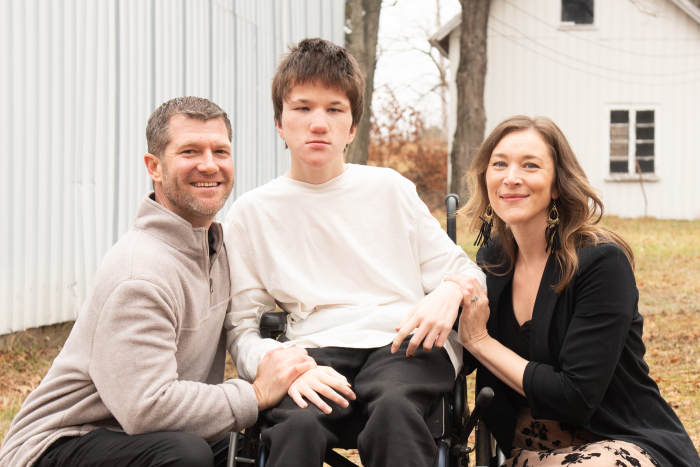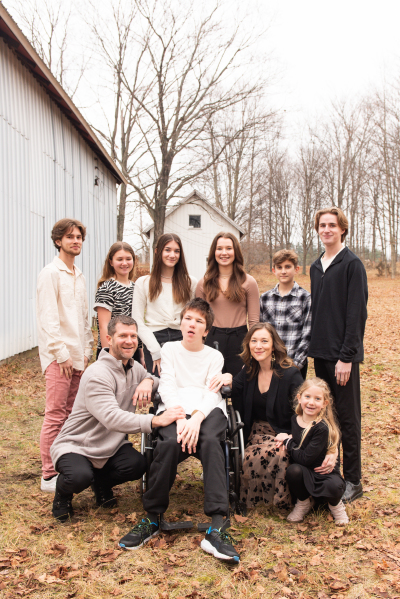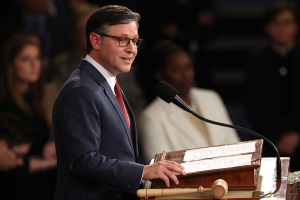Special needs mom on how to redefine caregiving as ‘holy work,’ issues call to action to Church

Jessica Ronne’s journey as a caregiver began on a day that could have shattered her world.
In 2004, during a routine ultrasound appointment for her second child, doctors informed her that her unborn son had experienced a stroke in utero. They offered no hope, suggesting she terminate the pregnancy and “try again.” But Ronne and her husband refused.
“We put our baby in the Lord’s hands and just had faith that God's will would be done,” she recalled.
When Lucas was born on Aug. 12, 2004, “screaming with life,’” Ronne became what she termed “a forever caregiver.” Lucas’ profound disabilities would require lifelong care. But at the time, she was simply grateful for her miracle baby.
“It wasn't even something I really focused on,” she said.
A few years later, her world shifted again when her husband was diagnosed with a terminal brain tumor. For three years, they fought the cancer while raising four young children, including Lucas. By 2010, Jess, then 33, was a widow raising four children younger than 7.
Yet, it was in this crucible of grief and responsibility that Ronne discovered an unshakable resilience.
“My kids got me out of bed every day. I had to keep living for them,” she said. “Even as I buried my husband, I promised him that our children wouldn’t lose two parents — one to death and one to depressive grief.” Anchored by faith, she found the strength to take each step forward.
“I just leaned into the Lord, and he provided what I needed, which was just enough manna for the moment, and I was just able to continue to put one foot in front of the other and continue to live for my children,” she said.
Today, Ronne is a powerful advocate for parent caregivers, a demographic she said remains largely invisible to society. Years after her husband’s passing, Ronne met Ryan, a father of three who’d also lost his spouse to cancer. The two married in 2015, and they later welcomed a daughter, bringing their blended family to 10.
As the founder and executive director of The Lucas Project, she works to provide recognition, resources and respite for families like hers.
“I do believe there are a lot of good people in the world who are willing to help if they know what the needs are. But … with these profound disabilities comes nonverbal, comes screaming, comes behavioral issues, comes incontinence, all things my 20-year-old son has. And so, the world just isn't made for families like ours,” she said.
“We isolate ourselves in our homes with these behaviors, with the aggression, with the incontinence. I often even speak with pastors at churches, and they're like, ‘We don't have these families in our community.’ And I'll say, ‘Yes, you do, you just don't see them.’ The church is not created for these families. Environments aren't created for these families.”

Through The Lucas Project, the Michigan native has developed care packages, resource databases, and support groups. She also speaks nationally about the realities of caregiving and produces films like “Unseen: How We’re Failing Parent Caregivers,” a documentary that sheds light on the isolation and mental health struggles these families face.
“We have a tsunami of children with special needs aging into adulthood,” she said. “If we don’t step in with resources, it will be detrimental to society.”
According to Ronne, the Church has a pivotal role in addressing these needs, but many congregations shy away due to fear of the unknown.
“Each child is so different, and the Church doesn’t know its place,” she said. “But helping doesn’t have to mean direct care for the child. It can be mowing a family’s lawn, bringing over a meal, or picking up groceries. Small groups within a church could adopt a family, learning together how to meet their needs.”
She urged congregations to step out of their comfort zones: “This is exactly the kind of work Jesus did — stepping into messy, uncomfortable spaces,” she said.
Ronne encouraged other caregivers to see their work as “holy,” though acknowledging it can be overwhelming. She recounted a moment of frustration, overwhelmed by her son’s needs while managing the production of the documentary.
“I felt like Jesus said to me, ‘This is holy work. I would be right here with you doing this.’ It reframed everything. Caring for another individual is the holiest work we can do this side of eternity,” she said.
That perspective is central to her latest book,Caregiving with Grit and Grace.“It’s about viewing caregiving in light of eternity,” she says. “We might not see our reward this side of Heaven, but we’re living for that ‘Well done, good and faithful servant.’”
In February, Luke moved into a group home, a decision Ronne once thought she’d never make. “When Lucas was little, I couldn’t imagine him living anywhere but with me,” she said. “But as he grew, his needs became more complex. It’s been a transition for all of us, but he’s thriving. He’s gained so many skills and is living his best life.”
The move has also brought newfound peace to Ronne and her family. “For years, weekends were overwhelming. Now they’re relaxing. My husband and I can take a nap if we want to,” she said. “My work had revolved around being Lucas’ caregiver for 20 years. It’s a period of transition, but also one of rest.”
As National Caregivers Month brings attention to the 16.3 million caregivers in the U.S., Ronne urged society to take stock of how they can support families with special needs children.
“I think a lot of caregivers kind of have the smarter mentality, like, ‘Nobody can do it like me. I'll be fine,’” she said.” We're not fine. We're exhausted. Let people bless you by stepping into your circumstances and providing a meal or providing some respite so that you can go take a nap, you can go for a walk, or just do something to rejuvenate yourself. Jesus wants that for us too. He wants us to be our best versions for the ones that we care for.”
In a world where caregivers are often unseen, Ronne said she wants to make sure their stories — and their struggles — are finally recognized. For caregivers themselves, she offered encouragement: “I hope that caregivers feel permission to feel anger, joy, pain,” she said.
“It’s such a juxtaposition when you're a caregiver, because there can be such joyful moments, but there are such painful moments too. It’s learning to live in that tension of the joy and the pain. The holiness of the acts that we do day by day by day is the glue that binds all of that together.”
Leah M. Klett is a reporter for The Christian Post. She can be reached at: leah.klett@christianpost.com





























